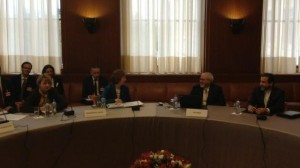 Iran�signalled the possibility of significant concessions over its nuclear programme in talks that closed on Wednesday, bringing the prospect of a breakthrough closer than at any time in the last decade, according to western diplomats.
Iran�signalled the possibility of significant concessions over its nuclear programme in talks that closed on Wednesday, bringing the prospect of a breakthrough closer than at any time in the last decade, according to western diplomats.A senior US official said that for the first time the two sides were at the start of negotiations "where one could imagine that you could possibly have an agreement". The White House said the presentation Iran brought to Geneva was "a new proposal with a level of seriousness and substance" not seen before.
However, both western and Iranian officials cautioned that there was a huge amount of diplomatic work still to be done to hammer out a trade-off between western sanctions relief and Iranian acceptance of curbs on its uranium enrichment and other nuclear work. All sides agreed to reconvene on a senior level on 7 November, with lower-level expert discussions before that.
Those discussions will focus on Iranian indications in Geneva that Tehran could agree limits on its nuclear programme that ensure it can be used for peaceful purposes, and ultimately accept more stringent international monitoring. Iran has also requested that the US delegation bring financial experts to go into detail on how the economic straitjacket on Iran could be loosened.
Diplomats from a six-nation negotiating group who took part in the two days of talks in Geneva said they were unlike any that had gone before. One western official said the two-day meeting in Geneva marked the beginning of the first true negotiations between Iran and the west since the Iranian nuclear programme first came to light in 2002.
"Before, the Iranians came to make speeches. This had a completely different tone and atmosphere," said a western official. "Everything was on the table and we discussed everything in depth."
In an unprecedented joint statement, the EU foreign policy chief, Catherine Ashton, who chairs the six-nation group, and the Iranian foreign minister, Mohammad Javad Zarif, described the two days in Geneva as "substantive and forward-looking negotiations". It noted that Zarif had begun the meeting by presenting "an outline of a plan as a proposed basis for negotiation, which is being carefully considered by the [six-nation group] as an important contribution."
Very few details of Zarif's PowerPoint presentation, entitled Closing an Unnecessary Crisis: Opening New Horizons, were released. However, Iranian and western diplomats made clear that the plan involved a timetable that included initial confidence-building steps at the start, implemented within the first six months, leading eventually to a comprehensive and permanent settlement, in which Iran could pursue a peaceful atomic programme without suffering punitive measures.
Iranian officials said they had put on the table a variety of possible limitations on Iran's enrichment of uranium in return for sanctions relief and international recognition of Iran's sovereign right to carry out enrichment, which is necessary to make both power reactor fuel and fissile material for weapons.
To reassure the international community that the Iranian programme was entirely peaceful, the Iranian deputy foreign minister, Abbas Araqchi, said Tehran could contemplate acceptance of more intensive inspections by the International Atomic Energy Agency. The inspections regime, known as the additional protocol, allows inspectors to go to sites where they suspect there could be nuclear-related activity, and not just those declared by Iran.
However, both Araqchi and Zarif, in a press conference at the end of the negotiations, stressed that acceptance of the protocol could only come at the end of negotiations and was currently ruled out by Iran's parliament, the Majlis.
In return, western officials have signalled that a final settlement could include a form of words that acknowledges Iran's enrichment of uranium as an established fact, as long as it is limited to producing low-enriched uranium necessary for a peaceful power-generating programme.
"I've been doing this now for about two years," a senior US official said, "and I have never had such intense, detailed, straightforward, candid conversations with the Iranian delegation before."
The official added: "Although there remain many differences in each area, and what sanctions relief might be appropriate, specific and candid discussions took place."
The two days of talks were completed despite severe back pains that came close to immobilising Zarif. He was accompanied by a doctor, underwent acupuncture during the talks and arrived at a concluding press conference in a wheelchair to be lifted bodily onstage. However, his health problems provided common ground with his western counterparts.
"There is no one among us that doesn't have a back problem with all the flying we all do," the American official said. "Every one of us had a back story for him, and had suggestions for books he should read, things he could try."
William Hague hailed the Geneva talks as the first substantive discussions with Iran "on how to address the international community's serious concerns about Iran's nuclear programme".
"I hope that negotiations will lead soon to concrete results. Iran will need to take the necessary first steps on its programme and we are ready to take proportionate steps in return. It is important that we maintain the positive momentum of the negotiations but we should not forget that Iran's nuclear programme is continuing to develop. There is a great deal of hard work ahead, but we must not waste this opportunity."
By The Guardian
The Iran Project is not responsible for the content of quoted articles.










